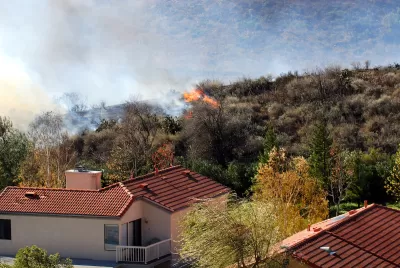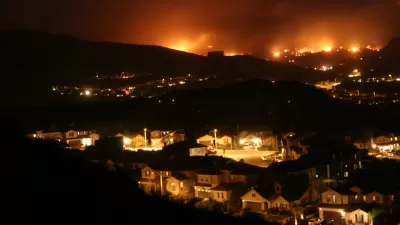Homeowners in places at risk for wildfires and other disasters find it harder than ever to secure an affordable insurance policy as companies leave some states altogether.

Home insurance companies are abandoning some markets in the Western United States as increasingly devastating and unpredictable wildfires and other disasters drive up costs.
“According to a report from the nonprofit climate research firm First Street Foundation, 39 million homes nationwide are at risk of losing their insurance due to climate hazards,” writes Kylie Mohr in High Country News, prefacing an interview with former California insurance commissioner Dave Jones.
According to Jones, the main driver of higher insurance premiums is climate change. “Until we stop using fossil fuels and reduce greenhouse gas emissions associated with other sectors of the economy, we’re going to continue to march steadily toward an uninsurable future,” Jones said.
Jones noted that “One thing insurers could do would be to transition out of fossil fuels and other high greenhouse gas-emitting industries as an investor.” They could also adjust their models to account for “landscape-scale forest management” initiatives that reduce fire risk.
Mohr adds that “Recently proposed changes to California’s insurance regulations may allow insurance companies to include wildfire-preparedness measures, such as safety certifications and prescribed burns, in their pricing models.”
Jones also suggests that states should adopt stringent building codes to make structures more fire-resistant and provide assistance for retrofitting programs. When it comes to insurance assistance programs like California’s Fair Access to Insurance Requirements (FAIR) plan, Jones says “Even though it’s expensive, I would argue strongly against artificially suppressing the rates of the FAIR plan, because then you start sending the wrong signal about the risk in certain areas due to climate change.”
FULL STORY: Homeowner’s insurance is going up in smoke

Montreal Mall to Become 6,000 Housing Units
Place Versailles will be transformed into a mixed-use complex over the next 25 years.

Planetizen Federal Action Tracker
A weekly monitor of how Trump’s orders and actions are impacting planners and planning in America.

California High-Speed Rail's Plan to Right Itself
The railroad's new CEO thinks he can get the project back on track. The stars will need to align this summer.

Nevada Legislature Unanimously Passes Regional Rail Bill
If signed by the governor, the bill will create a task force aimed at developing a regional passenger rail system.

How Infrastructure Shapes Public Trust
A city engineer argues that planners must go beyond code compliance to ensure public infrastructure is truly accessible to all users.

Photos: In Over a Dozen Cities, Housing Activists Connect HUD Cuts and Local Issues
We share images from six of the cities around the country where members of three national organizing networks took action on May 20 to protest cuts to federal housing funding and lift up local solutions.
Urban Design for Planners 1: Software Tools
This six-course series explores essential urban design concepts using open source software and equips planners with the tools they need to participate fully in the urban design process.
Planning for Universal Design
Learn the tools for implementing Universal Design in planning regulations.
City of Camden Redevelopment Agency
City of Astoria
Transportation Research & Education Center (TREC) at Portland State University
Municipality of Princeton (NJ)
Regional Transportation Commission of Southern Nevada





























